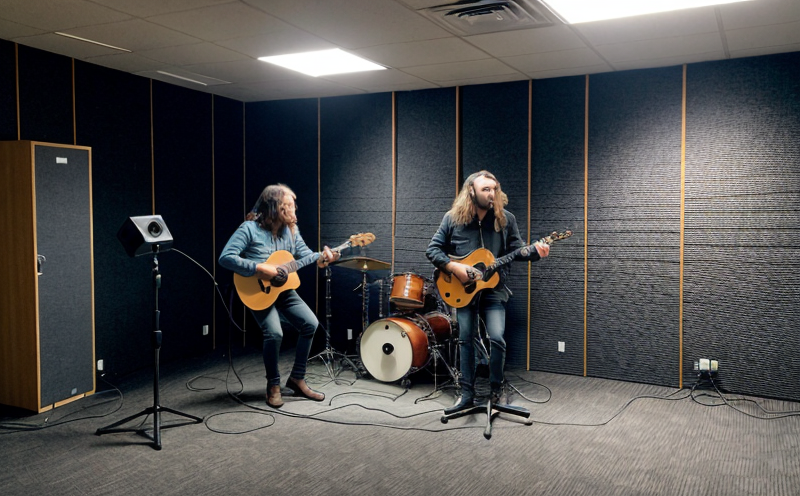ISO 2923-1 Sound Level Testing for Refrigeration Units
The ISO 2923 series is a comprehensive set of standards that cover sound and vibration testing of refrigeration units. The specific standard ISO 2923-1:2015 focuses on measuring the sound power level, A-weighted sound pressure levels, and noise emission from refrigeration units in stationary conditions.
Sound level testing is a critical component for ensuring that HVAC equipment meets both regulatory standards and customer expectations. In the realm of HVAC equipment testing, acoustic and noise testing ensures that the units are not only efficient but also operate within acceptable noise parameters to avoid disturbing neighboring environments. This service is particularly important in sectors such as industrial manufacturing, commercial buildings, residential complexes, and public facilities.
The process involves placing the refrigeration unit under test in a controlled environment where it operates at its normal operating conditions. Instruments are then used to measure various sound levels at specific distances from the equipment. The data collected is analyzed according to ISO 2923-1 standards to determine compliance with specified limits.
The accuracy of these tests is paramount, and our laboratory employs state-of-the-art equipment and trained personnel to ensure precise measurements. We also offer detailed reports that include all relevant data points along with interpretations based on industry best practices. This information can be invaluable for quality managers looking to maintain high standards or R&D engineers aiming to improve product performance.
Understanding the noise characteristics of refrigeration units is essential because excessive noise can lead to operational issues, increased maintenance costs, and even potential health risks for personnel working in close proximity. By conducting ISO 2923-1 sound level tests early in the development cycle or during quality assurance checks, you can identify and address any problematic areas before they escalate into larger issues.
In addition, compliance with international standards like ISO ensures that your products meet global requirements, enhancing market access opportunities across different regions. It also demonstrates a commitment to sustainable practices by minimizing noise pollution, which is increasingly becoming an important consideration for both manufacturers and consumers alike.
Scope and Methodology
The scope of ISO 2923-1 sound level testing encompasses the measurement techniques used to assess the acoustic performance of refrigeration units. This includes setting up a controlled environment, selecting appropriate measuring points around the unit, operating it under specified conditions, and recording sound pressure levels using precision instruments.
- Measuring Points: The standard specifies locations such as front, back, sides, top, and bottom of the refrigeration unit where noise measurements should be taken.
- Operating Conditions: Units are tested while they operate under typical load conditions to simulate real-world usage scenarios accurately.
The methodology involves using specialized equipment such as sound level meters (SLMs) configured with appropriate microphones and calibrators. These devices measure the ambient noise levels before starting the test, ensuring accurate baseline readings. During testing, the SLMs are positioned at each designated point around the unit to capture sound pressure levels.
After collecting raw data, it is analyzed according to ISO 2923-1 guidelines which specify how to interpret results in terms of octave bands and overall A-weighted sound level (dBA). Compliance with these criteria ensures that the refrigeration units meet the specified limits set forth by regulatory bodies.
The testing process also involves recording other parameters like humidity, temperature, and ambient noise levels. This comprehensive approach provides a complete picture of the unit's acoustic behavior under various conditions, making it easier to diagnose any potential issues early on in the production cycle or during ongoing maintenance activities.
Benefits
- Better Product Quality: Ensures that refrigeration units meet stringent noise emission standards, leading to improved product quality and reliability.
- Enhanced Customer Satisfaction: By reducing noise levels in operational environments, customer satisfaction can be significantly enhanced, particularly in residential settings where quiet operation is highly valued.
- Regulatory Compliance: Helps manufacturers stay compliant with local and international regulations regarding industrial noise pollution control.
- Sustainable Practices: Minimizes unnecessary noise emissions which contribute positively towards sustainable development goals set by various countries worldwide.
In addition to these tangible benefits, ISO 2923-1 sound level testing also helps in identifying areas where improvements can be made during the design phase or modifications needed post-production. This proactive approach not only enhances product performance but also reduces the likelihood of costly recalls later on.
Moreover, this service supports continuous improvement initiatives by providing actionable insights that drive innovation within organizations. For instance, R&D engineers often use the findings from such tests to refine designs and implement new technologies aimed at reducing noise emissions further.
International Acceptance and Recognition
The ISO 2923-1 standard has gained widespread acceptance across numerous countries due to its rigorous methodology and consistent approach towards assessing the acoustic performance of refrigeration units. Many jurisdictions have adopted it as part of their national standards or guidelines for HVAC equipment.
- United States: While not mandatory, many American companies voluntarily comply with ISO 2923-1 to ensure their products meet global market demands and regulatory expectations.
- European Union: Several EU member states include compliance with this standard as part of their directives related to environmental protection and industrial noise control.
- Other Regions: Countries like Japan, China, India, and many others recognize ISO 2923-1 for its reliability and accuracy in measuring sound levels from refrigeration units. This global recognition enhances the competitiveness of HVAC equipment manufacturers who adhere to these standards.
The standard's universal applicability makes it an essential tool for businesses operating internationally. By ensuring that their products meet ISO 2923-1 requirements, companies can confidently enter new markets without facing compliance challenges at each destination.
Furthermore, adhering to this international standard demonstrates a company’s commitment to environmental sustainability and responsible business practices. This aligns with growing consumer preferences for eco-friendly options and adds value to the brand image of organizations involved in HVAC equipment manufacturing.





